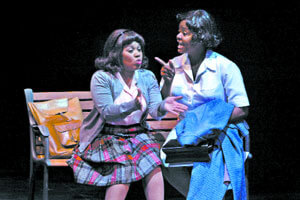Tony Kushner’s first musical score leads its capable cast into a thicket of trouble
The kids’ faces light up as they eye their riches. The celebration dance they perform and the jubilant song they sing—a precocious ditty about a boy named “Roosevelt Petrucious Coleslaw”—is downright joyful.
At that moment it finally dawns on you that something has finally, thankfully, happened.
“Caroline, or Change” is the world premiere musical by composer Jeanine Tesori and gay playwright Tony Kushner, who breathed new life into the American theater ten years ago with his groundbreaking play “Angels in America.” This show is Kushner’s first musical and his first collaboration with director George C. Wolfe since “Angels.”
Full of pulsating ideas, inventive conceits—a singing moon, a crooning washing machine—and politically-minded rants, “Caroline’s” creators nonetheless forgot one very important thing: to tell a story.
The result, an achingly lifeless collection of sketches in search of a melody, is one of the most delightfully imagined, yet frustratingly flat-lined shows of the season.
The script, loosely based on Kushner’s upbringing in Louisiana in the 1960s, focuses on Noah Gellman (Harrison Chad), a sensitive eight-year-old Jewish boy imbued with an uncanny maturity, as he carries on an odd love-hate friendship with Caroline, his family’s frosty 39-year-old black maid.
Noah dreams of getting away from his distant father (David Costabile) and fragile stepmother (Veanne Cox), who struggles to establish even the barest of relationships with the child. At night from bed, Noah chats with Caroline, who answers him in weary tones from the front porch.
Adhering to his family’s socialist ideals, Noah thrills when his mother allows Caroline to keep any loose change the boy purposefully forgets in his pants. Even at eight he knows poverty when he sees it.
The sorrowful Caroline, however, has the weight of the world on her shoulders. Still hurting from the death of her husband and besieged by financial woes, she struggles to make sense of a rapidly changing world that finds her friends dressing provocatively, her children sassing back at white folks, and her president assassinated.
Only in the play’s final moments, when Caroline realizes she must adapt to her new world or risk being lost within it, does the play finally expose its affecting message of despair and expectation.
As novel as it is, the problem with “Caroline, or Change” is one of layering gone wild. Tesori’s music takes sharp turns, almost minute by minute, from gospel to klezmer to blues to jazz to pop to R&B, making the show a dissonant maze of style and substance.
Kushner’s script, which veers wildly from locale to locale, suffers from a similar case of storytelling A.D.D. He confronts the schisms of numerous isms—communism, racism, anti-Semitism—with the gusto of the intellectual powerhouse that he is, but without the narrative discipline he used in “Angels.” Much is said, but little actually happens.
Despite Wolfe’s crisp pacing, the exposition-saturated show feels like a marriage made in workshop hell. The show is overwritten and overscored, and as a result the narrative becomes encrypted into a language the audience has a hard time translating.
Scenic designer Riccardo Hernandez and lighting designers Jules Fisher and Peggy Eisenhauer have done an admirable job of creating a space malleable enough to facilitate the script’s busy travels. But with thick pockets of darkness here and there, the set feels limp. It makes you yearn for the gorgeously transformative, yet smartly economic set that brought “Angels” to life.
Kudos, however, to Paul Tazewell’s fantastic costumes.
The cast is top notch. Chad is charismatic and winsome as Noah, Cox is delightfully bewildered as his mother, and the soulful Anika Noni Rose plays Caroline’s daughter Emmie with perfect nuance.
But the show belongs to Pinkins, who mesmerizes as the angry and brittle Caroline. Building her anger with songs tinged with sadness and fear, Tesori smartly gives Pinkins, who won a Tony Award for “Jelly’s Last Jam,” an astonishingly dynamic “Rose’s Turn” near the end. Singing in a voice choked with emotion and raw with rage, she delivers a bravura performance that’s thrilling in its intensity.
This is a big month for Kushner. In addition to his debut as a musical writer, the film adaptation of “Angels in America,” directed by Mike Nichols and starring Al Pacino, Meryl Streep, and Emma Thompson, hits HBO on December 7. It’s a must-see event.
But audiences eager to see Kushner at the top of his game should be sure to make a date with the small screen, and save the stage for a night when their expectations aren’t as high.
PHOTO BYMichal Daniel


































